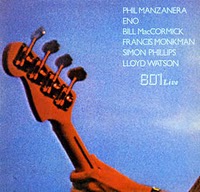 Not your every day live album, 801 Live captures the supergroup featuring ex-Roxy Musicians Phil Manzanera and Brian Eno in one of their few performances. Featuring all the sonic detail, colorful guitar and synthesizer tones, and high-class musicianship you’d expect from such a lineup, another pleasant surprise here is the excellent recording, which almost sounds more like a studio album. A subtle, delicate style informs many of these performances, highlighting tracks from Eno and Manzanera’s early solo albums, the Quiet Sun album, and skewed reworkings of “Tomorrow Never Knows” and “You Really Got Me.” Brainy and electronic, but warm and human as well, 801 Live is an essential purchase for fans of the musicians involved, or seventies art-rock in general. –Ben
Not your every day live album, 801 Live captures the supergroup featuring ex-Roxy Musicians Phil Manzanera and Brian Eno in one of their few performances. Featuring all the sonic detail, colorful guitar and synthesizer tones, and high-class musicianship you’d expect from such a lineup, another pleasant surprise here is the excellent recording, which almost sounds more like a studio album. A subtle, delicate style informs many of these performances, highlighting tracks from Eno and Manzanera’s early solo albums, the Quiet Sun album, and skewed reworkings of “Tomorrow Never Knows” and “You Really Got Me.” Brainy and electronic, but warm and human as well, 801 Live is an essential purchase for fans of the musicians involved, or seventies art-rock in general. –Ben
Jive Time Turntable
Joni Mitchell “The Hissing of Summer Lawns” (1975)
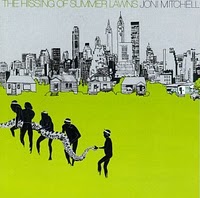 And so, the dazzling beauty of Court and Spark carries on with The Hissing of Summer Lawns. Musically, it continues in a similar vein – an all-star lineup effortlessly shifting between Pop, Folk and Jazz, playing rich, multi-layered arrangements which never overpower Joni, whose main concern is always the song and its words. The lyrics have become more intimate, more melancholic on The Hissing of Summer Lawns and so has the music. Again, one or two songs don’t meet my undivided approval (Shadows and Light and The Jungle Line, even though the song marks the beginning of a lasting Pop format, the attempt to create a multicultural world music, ten years before Peter Gabriel, Sting and others), but the rest is again of celestial beauty. Even Joni, who would go on to record important albums until today, wasn’t able to match the artistic consistency and beauty of Court And Spark and The Hissing of Summer Lawns until many years later, with Turbulent Indigo and Travelogue. –Yofriend
And so, the dazzling beauty of Court and Spark carries on with The Hissing of Summer Lawns. Musically, it continues in a similar vein – an all-star lineup effortlessly shifting between Pop, Folk and Jazz, playing rich, multi-layered arrangements which never overpower Joni, whose main concern is always the song and its words. The lyrics have become more intimate, more melancholic on The Hissing of Summer Lawns and so has the music. Again, one or two songs don’t meet my undivided approval (Shadows and Light and The Jungle Line, even though the song marks the beginning of a lasting Pop format, the attempt to create a multicultural world music, ten years before Peter Gabriel, Sting and others), but the rest is again of celestial beauty. Even Joni, who would go on to record important albums until today, wasn’t able to match the artistic consistency and beauty of Court And Spark and The Hissing of Summer Lawns until many years later, with Turbulent Indigo and Travelogue. –Yofriend
The La’s “The La’s” (1990)
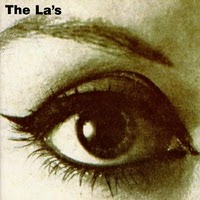 Even though John Power was an essential member of The La’s, I’m loathe to label the band the forerunner of Cast. There are some similarities in the homogeneous nature of the pop music but Power had little to do with writing anything for The La’s. The band was almost the private property of Lee Mavers who, if proof were needed of that fact, took it upon himself to destroy the only copy of the master tapes for the proposed second album because he was dissatisfied with the results. An action which ensured the self-destruction of the band. On the one hand the band’s demise was a cause for pity. The timeless nature of some of the songs, particularly “There She Goes”, hinted at them being around for some time to come. However, on the other hand, the perfectionist disposition of Mavers would probably result in interminable periods of time between albums during which the fickle music fan would have moved on to pastures new. Whilst the songs smack of a long Merseyside tradition for producing enduring pop, Mavers almost hypnotises the listener by repeating the same word or phonetic sounds throughout. The effect lulls you into a trance-like state and the music carries you with it. It really is quite an amazing album and one for which a follow-up would have been eagerly awaited. –Ian
Even though John Power was an essential member of The La’s, I’m loathe to label the band the forerunner of Cast. There are some similarities in the homogeneous nature of the pop music but Power had little to do with writing anything for The La’s. The band was almost the private property of Lee Mavers who, if proof were needed of that fact, took it upon himself to destroy the only copy of the master tapes for the proposed second album because he was dissatisfied with the results. An action which ensured the self-destruction of the band. On the one hand the band’s demise was a cause for pity. The timeless nature of some of the songs, particularly “There She Goes”, hinted at them being around for some time to come. However, on the other hand, the perfectionist disposition of Mavers would probably result in interminable periods of time between albums during which the fickle music fan would have moved on to pastures new. Whilst the songs smack of a long Merseyside tradition for producing enduring pop, Mavers almost hypnotises the listener by repeating the same word or phonetic sounds throughout. The effect lulls you into a trance-like state and the music carries you with it. It really is quite an amazing album and one for which a follow-up would have been eagerly awaited. –Ian
The Human League “Dare!” (1981)
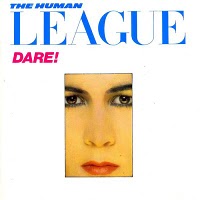 When Ian Craig Marsh and Martyn Ware left the Human League following the release of the band’s second album “Travelogue”, one would have thought that the sole remaining member Philip Oakey would have either called it a day, or risked a solo career. When the music press revealed that he was re-assembling the new Human League with an unknown Bass player ( Ian Burden), a slide projector operator (Philip Adrian Wright), two girls he had met in Sheffield club with no musical experience whatsoever (Joanne Catherall and Susanne Sulley), and a guitarist from the long defunct Punk band The Rezillos (Jo Callis), many must have thought that Oakey had lost the plot, and the world was half expecting the next appointment to ba a fire eating lion tamer from Halifax. Virgin uneasily supported Oakey’s moves and recording started on the band’s 3rd album “Dare”, with The Stranglers producer Martin Rushent at the helm. Musically, Oakey wanted to retain the mechanical, industrial synthesised instrumentation and style, but introduce a Pop and Dance element to make the music a more viable proposition to the growing New Romantic following. He suceeds, and “Dare” is THE best Pop/Synth/New Romantic album of the era, a culmination of great Pop songs, dark vocals, and simple, crisp instrumentation, resulting in a number one album in the U.K. and a top 5 success in the States. There are many highlights, from the pure Pop duets “Don’t You Want Me” and “Open Your Heart”, the brilliant Dance numbers “Sound Of The Crowd” and “Love Action”, the upbeat “Things That Dreams Are Made Of”, and the paranoic “Darkness”. A masterpiece of it’s time, and Oakey would never be able to recapture this moment again. The album gave us an excitement that no one had come close to. –Ben H
When Ian Craig Marsh and Martyn Ware left the Human League following the release of the band’s second album “Travelogue”, one would have thought that the sole remaining member Philip Oakey would have either called it a day, or risked a solo career. When the music press revealed that he was re-assembling the new Human League with an unknown Bass player ( Ian Burden), a slide projector operator (Philip Adrian Wright), two girls he had met in Sheffield club with no musical experience whatsoever (Joanne Catherall and Susanne Sulley), and a guitarist from the long defunct Punk band The Rezillos (Jo Callis), many must have thought that Oakey had lost the plot, and the world was half expecting the next appointment to ba a fire eating lion tamer from Halifax. Virgin uneasily supported Oakey’s moves and recording started on the band’s 3rd album “Dare”, with The Stranglers producer Martin Rushent at the helm. Musically, Oakey wanted to retain the mechanical, industrial synthesised instrumentation and style, but introduce a Pop and Dance element to make the music a more viable proposition to the growing New Romantic following. He suceeds, and “Dare” is THE best Pop/Synth/New Romantic album of the era, a culmination of great Pop songs, dark vocals, and simple, crisp instrumentation, resulting in a number one album in the U.K. and a top 5 success in the States. There are many highlights, from the pure Pop duets “Don’t You Want Me” and “Open Your Heart”, the brilliant Dance numbers “Sound Of The Crowd” and “Love Action”, the upbeat “Things That Dreams Are Made Of”, and the paranoic “Darkness”. A masterpiece of it’s time, and Oakey would never be able to recapture this moment again. The album gave us an excitement that no one had come close to. –Ben H
Parliament “Funkentelechy vs. the Placebo Syndrome” (1977)
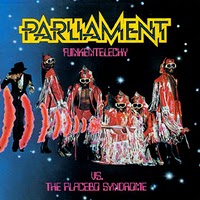 George Clinton was unstoppable. The previous album The Clones Of Dr. Funkenstein was good, but this LP is unbelievable. Bob Gun opens the album with danceable Funk. Then, Sir Nose d’Voidoffunk: aside from being ultra-funky and the “lyrics” mad beyond control, the music here may be the most advanced and far-reaching of all Parliament tracks. Just listen to Bernie Worrell’s synth wizardry and his abstract comments on the acoustic piano, Clinton’s Sir Nose travesty, the girls’ background vocals, the brass arrangement, the fat bass – at a running time of more than ten minutes, this song is a miracle! Other highlights: Funkentelechy (also over ten minutes long) and the hit, Flash Light . –Yofriend
George Clinton was unstoppable. The previous album The Clones Of Dr. Funkenstein was good, but this LP is unbelievable. Bob Gun opens the album with danceable Funk. Then, Sir Nose d’Voidoffunk: aside from being ultra-funky and the “lyrics” mad beyond control, the music here may be the most advanced and far-reaching of all Parliament tracks. Just listen to Bernie Worrell’s synth wizardry and his abstract comments on the acoustic piano, Clinton’s Sir Nose travesty, the girls’ background vocals, the brass arrangement, the fat bass – at a running time of more than ten minutes, this song is a miracle! Other highlights: Funkentelechy (also over ten minutes long) and the hit, Flash Light . –Yofriend
The Velvet Underground “1969: The Velvet Underground Live with Lou Reed” (1974)
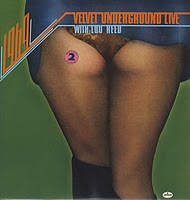 “Good evening, we’re the Velvet Underground…” It’s a far cry from another intro uttered that same year: “Ladies and gentleman, the greatest rock and roll band in the world…” Lou Reed’s intro is obviously more understated and, coming from a notoriously prickly New Yorker, surprisingly cordial. And it goes on for awhile… After asking the audience if they would prefer a one-long-set or two-set performance, we get a recap of a Dallas Cowboys game. Almost a full minute and a half has passed when, out of nowhere, Reed casually states, “This is a song called I’m Waiting for My Man”. The band then wastes no time locking into an historic, rock-solid groove.
“Good evening, we’re the Velvet Underground…” It’s a far cry from another intro uttered that same year: “Ladies and gentleman, the greatest rock and roll band in the world…” Lou Reed’s intro is obviously more understated and, coming from a notoriously prickly New Yorker, surprisingly cordial. And it goes on for awhile… After asking the audience if they would prefer a one-long-set or two-set performance, we get a recap of a Dallas Cowboys game. Almost a full minute and a half has passed when, out of nowhere, Reed casually states, “This is a song called I’m Waiting for My Man”. The band then wastes no time locking into an historic, rock-solid groove.
1969: The Velvet Underground Live with Lou Reed has always been a VU fan favorite, but it’s overshadowed by the band’s iconic studio catalog. Misguided marketing and lame packaging are also to blame for its somewhat limited cult status. Released in 1974, during the most lucrative period of Lou Reed’s solo career, Mercury’s insistence on using his name in the title implied that other members of the VU were little more than his backing band, which couldn’t be further from the truth. The inner gatefold spread is also misleading, depicting an earlier and different (in both sound and appearance) incarnation of the band. Finally there’s the cover itself, which, in the immortal words of Patti Smith, “eats shit”. Despite this indifferent misrepresentation, this record is the first and last word in any discussion about the Velvet Underground as a live act. Almost all of the band’s classics are here, given new life—sometimes even bettered—by Reed’s remarkably expressive vocals (one pines for the days when he actually sang), Sterling Morrison’s precision guitar work, Mo Tucker’s majestically simplistic drumming, and the melodic bass-playing of the most under-appreciated VU member, Doug Yule. Surprisingly large amounts of live VU performances were recorded, but this collection—the bulk of which was culled from a multi-night engagement at a tiny club in Dallas—has the best sound quality of any that have survived. It’s a different sound than the sharp and crackly production of the 1967 “Banana” LP: bluesier, and with a bottom that rattles the windows and shakes the floors. It’s the sound of a band that’s been honing its craft in divey clubs and ballrooms across the US for over a year, and which, during the last few months of the ’60s, delivers the best live rock and roll show on either side of the Mississippi. –Richard P
XTC “English Settlement” (1982)
 What on earth was I thinking of? After English Settlement I gave up on XTC for 20 years! There’s simply no excuse. I knew the first time I heard English Settlement I was listening to a classic and yet I still let my interest lapse. This is probably one of the most perfectly crafted double albums by any English band, notwithstanding Exile On Main Street and London Calling. It contains such complex, intricate constructions the word “song” seems too restrictive a word to describe their function. Like an absorbing novel, a spectacular movie or a sumptuous meal, this album can be enjoyed on many levels. There was an abridged version of English Settlement released at the same time as this double and I’m aware that many prefer it, feeling it cuts out the filler. I’ve never heard it and I never want to. Listening to English Settlement today, I can’t think of a single track I’d want to get rid of. It would be like choosing a favourite from among my kids.
What on earth was I thinking of? After English Settlement I gave up on XTC for 20 years! There’s simply no excuse. I knew the first time I heard English Settlement I was listening to a classic and yet I still let my interest lapse. This is probably one of the most perfectly crafted double albums by any English band, notwithstanding Exile On Main Street and London Calling. It contains such complex, intricate constructions the word “song” seems too restrictive a word to describe their function. Like an absorbing novel, a spectacular movie or a sumptuous meal, this album can be enjoyed on many levels. There was an abridged version of English Settlement released at the same time as this double and I’m aware that many prefer it, feeling it cuts out the filler. I’ve never heard it and I never want to. Listening to English Settlement today, I can’t think of a single track I’d want to get rid of. It would be like choosing a favourite from among my kids.
Considering how perfect this album is I’ve always felt that it was around the release of English Settlement that it all started going wrong for XTC. An overstressed and exhausted Andy Partridge was overtaken by stage-fright and suffered a breakdown soon after the album’s release. As a result the album passed relatively unnoticed. How huge could this band have been if given the opportunity to publicise and tour English Settlement? How huge could this band have been if Partridge had ever been able to overcome his fear? Tragic really.
Even though Colin Moulding contributes the ska rhythms of “English Roundabout”, the twisted “Fly On The Wall” and the excellent “Ball And Chain”, English Settlement really is Partridge’s album. “Senses Working Overtime” would provide the band with their only top ten single. “All Of A Sudden (It’s Too Late)” is simply sublime. “Yacht Dance” is a mix of pure pop and English folk and Dave Gregory’s Spanish guitar is a revelation and the flamenco rhythms continue to ripple through anti-gun rant “Melt The Guns”. “It’s Nearly Africa” brings the sounds of that continent into XTC’s quaintly weird world and “Snowman” takes what is well-worn subject matter for a song – a crumbling relationship – and comes at it from an unusual perspective.
English Settlement is a fabulous album but, amazingly, still isn’t the high point for XTC but, as an example of the quintessential English band playing the quintessential English eccentrics, it’s difficult to beat. –Ian
Miles Davis “My Funny Valentine” (1965)
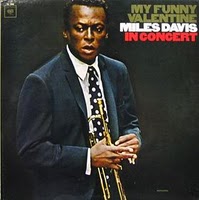 Never has there been such a perfect example of the difference between what we might call the Apollonian and Dionysian (if we were utterly pretentious). In February 1964, Miles Davis and his then band — Tony Williams on drums, Ron Carter on bass, Herbie Hancock on piano and George Coleman on sax — played a concert at New York’s Philharmonic Hall that was subsequently split for release on two LPs. The fast numbers went on Four and More, a fun little album but no great shakes; there’s plenty of power, but not much else. The ballads, though, wound up here, and the end result is one of the most beautiful and moving jazz records I own. It’s stunningly delicate; the five musicians play with almost ESP-like sensitivity to each other. Listen, though, to Miles; he has rarely played with such lyricism, such emotion. “Stella by Starlight” in particular sounds like a direct connection to a place far deeper than any he has gone before. Naked, and necessary. –Brad
Never has there been such a perfect example of the difference between what we might call the Apollonian and Dionysian (if we were utterly pretentious). In February 1964, Miles Davis and his then band — Tony Williams on drums, Ron Carter on bass, Herbie Hancock on piano and George Coleman on sax — played a concert at New York’s Philharmonic Hall that was subsequently split for release on two LPs. The fast numbers went on Four and More, a fun little album but no great shakes; there’s plenty of power, but not much else. The ballads, though, wound up here, and the end result is one of the most beautiful and moving jazz records I own. It’s stunningly delicate; the five musicians play with almost ESP-like sensitivity to each other. Listen, though, to Miles; he has rarely played with such lyricism, such emotion. “Stella by Starlight” in particular sounds like a direct connection to a place far deeper than any he has gone before. Naked, and necessary. –Brad
The Bonzo Dog Doo-Dah Band “The Doughnut in Granny’s Greenhouse” (1968)
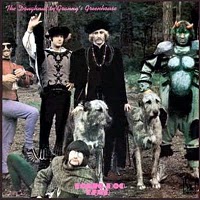 The great lost psychedelic album. On their second album the Bonzos knock off the trad jazz parodies and pair their surreal lyrics and wild imaginations with rock music to match. Neil Innes still gets to sing the catchiest songs — “Beautiful Zelda”, for instance, examines the perils of dating a space alien — but Vivian Stanshall beats him with what could be the band’s mission statement, “My Pink Half Of The Drainpipe”. Plus there’s the amazing Love parody “We Are Normal” (“and we dig Bert Weedon!”). The summit, though, is the too awesome for words “Rhinocratic Oaths”, which, with its cheery narration (“You should get out more, Percy, or you’ll start acting like a dog, ha ha … He was later arrested near a lamp-post”) reveals the Bonzo’s ultimate truth: that there is nothing so lunatic as what passes for everyday life. (Hey, that Dada/Doo-Dah wasn’t in their name for nothing.) If you have any spark of imagination or individuality, you must get this record. –Brad
The great lost psychedelic album. On their second album the Bonzos knock off the trad jazz parodies and pair their surreal lyrics and wild imaginations with rock music to match. Neil Innes still gets to sing the catchiest songs — “Beautiful Zelda”, for instance, examines the perils of dating a space alien — but Vivian Stanshall beats him with what could be the band’s mission statement, “My Pink Half Of The Drainpipe”. Plus there’s the amazing Love parody “We Are Normal” (“and we dig Bert Weedon!”). The summit, though, is the too awesome for words “Rhinocratic Oaths”, which, with its cheery narration (“You should get out more, Percy, or you’ll start acting like a dog, ha ha … He was later arrested near a lamp-post”) reveals the Bonzo’s ultimate truth: that there is nothing so lunatic as what passes for everyday life. (Hey, that Dada/Doo-Dah wasn’t in their name for nothing.) If you have any spark of imagination or individuality, you must get this record. –Brad
Royal Trux “Cats and Dogs” (1993)
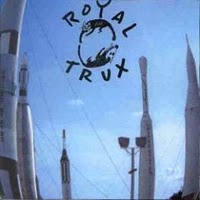 At a time when punk and indie were well into the mainstream, and everyone involved was flexing their love for all the classic rock heavies, little seemed to hit the target. Too much irony, too much 90’s production, no balance. It’s like punk was stuck in some kind of endless halloween. Royal Trux by all means should have blended right in; Stones worshiping hipster junkies playing dress up while kind of fumbling around with 70’s licks. Yet, somehow, they’re just so fucking cool that you cant deny their magnetic draw. Their vibe is smeared all over their sound and look and record covers in a way that makes up for EXTREME looseness at some points, by glorifying the superficial and criminal side of rock. “Cats and Dogs” is RTX at their peak of form, blending an avant-punk aesthetic with early 70’s rock grooves. The end result is a sort of 4-track collaged mess of vocals and guitars rolling all over the place like you’re listening to “Tonight’s the Night”, “White Light, White Heat”, and “Maggot Brain” at the same time. Shit is loose, man. Perfect for stoned chillin’ with the lights down. A great homage to rock history, check out this LP. –Alex
At a time when punk and indie were well into the mainstream, and everyone involved was flexing their love for all the classic rock heavies, little seemed to hit the target. Too much irony, too much 90’s production, no balance. It’s like punk was stuck in some kind of endless halloween. Royal Trux by all means should have blended right in; Stones worshiping hipster junkies playing dress up while kind of fumbling around with 70’s licks. Yet, somehow, they’re just so fucking cool that you cant deny their magnetic draw. Their vibe is smeared all over their sound and look and record covers in a way that makes up for EXTREME looseness at some points, by glorifying the superficial and criminal side of rock. “Cats and Dogs” is RTX at their peak of form, blending an avant-punk aesthetic with early 70’s rock grooves. The end result is a sort of 4-track collaged mess of vocals and guitars rolling all over the place like you’re listening to “Tonight’s the Night”, “White Light, White Heat”, and “Maggot Brain” at the same time. Shit is loose, man. Perfect for stoned chillin’ with the lights down. A great homage to rock history, check out this LP. –Alex
Magazine “Real Life” (1978)
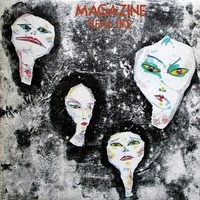 You can’t seem to pick up a music magazine nowadays without some interviewee citing Howard Devoto and Magazine as defining influences upon their own musical aspirations. Either that or some sycophantic retrospective which seems totally out of proportion for a band who were nothing more than a mote in the eye of music chronology. Amazingly, in this case, the hype is totally justified. Unhappy with the direction The Buzzcocks were taking and, possibly, recognising the limited shelf life of punk, Devoto formed Magazine and attempted to weave punk conviction into a more conventional and structured rock format. I’m convinced that longevity was no more guaranteed down this route, but it proved a panoramic trip whilst it lasted. The album is full of highlights and some quite astounding musical performances, particularly the bass and keyboards on the likes of “Definitive Gaze”. Messrs Adamson, McGeoch, Jackson and Formula deserve praise. Personally I have reservations about Devoto’s vocal style but as a discordant counterpoint to the music it works perfectly. “Shot By Both Sides” is spiky rock at its best and “The Light Pours Out Of Me” remains in my personal top twenty to this day. Magazine paved the path for post punk, pity they couldn’t walk the road for longer themselves. –Ian
You can’t seem to pick up a music magazine nowadays without some interviewee citing Howard Devoto and Magazine as defining influences upon their own musical aspirations. Either that or some sycophantic retrospective which seems totally out of proportion for a band who were nothing more than a mote in the eye of music chronology. Amazingly, in this case, the hype is totally justified. Unhappy with the direction The Buzzcocks were taking and, possibly, recognising the limited shelf life of punk, Devoto formed Magazine and attempted to weave punk conviction into a more conventional and structured rock format. I’m convinced that longevity was no more guaranteed down this route, but it proved a panoramic trip whilst it lasted. The album is full of highlights and some quite astounding musical performances, particularly the bass and keyboards on the likes of “Definitive Gaze”. Messrs Adamson, McGeoch, Jackson and Formula deserve praise. Personally I have reservations about Devoto’s vocal style but as a discordant counterpoint to the music it works perfectly. “Shot By Both Sides” is spiky rock at its best and “The Light Pours Out Of Me” remains in my personal top twenty to this day. Magazine paved the path for post punk, pity they couldn’t walk the road for longer themselves. –Ian
J.J. Cale “Troubadour” (1976)
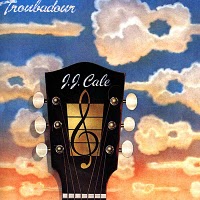 J.J. Cale’s fourth album Troubadour is a mixed stew of everything from country, jazz, arena rock, blues, folk to funk; and that’s just in the first song. He manages to whisper like Nick Drake, growl like John Lee Hooker and wine like Dylan…did I mention he’s an extremely adept guitar player as well? Cale’s songs have been covered by many artists, the most famous being “Cocaine” by Eric Clapton, but here we have the original; stripped down, but somehow fuller, with funky jabs and clumsy power chords. There’s also some simple love songs as well, “Hey Baby” never gets too corny with jazzy horn phrases intertwining with country style chicken-pickin.’ “Travelin’ Light” is an intense study of the driving song with guitars and vibes throughout, pulsing like highway lines in the corner of your eye. This record is about the groove, while brilliant arrangements and clever instrumentation provide the texture, making everything unclassifiable. –ECM Tim
J.J. Cale’s fourth album Troubadour is a mixed stew of everything from country, jazz, arena rock, blues, folk to funk; and that’s just in the first song. He manages to whisper like Nick Drake, growl like John Lee Hooker and wine like Dylan…did I mention he’s an extremely adept guitar player as well? Cale’s songs have been covered by many artists, the most famous being “Cocaine” by Eric Clapton, but here we have the original; stripped down, but somehow fuller, with funky jabs and clumsy power chords. There’s also some simple love songs as well, “Hey Baby” never gets too corny with jazzy horn phrases intertwining with country style chicken-pickin.’ “Travelin’ Light” is an intense study of the driving song with guitars and vibes throughout, pulsing like highway lines in the corner of your eye. This record is about the groove, while brilliant arrangements and clever instrumentation provide the texture, making everything unclassifiable. –ECM Tim


